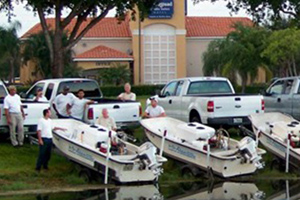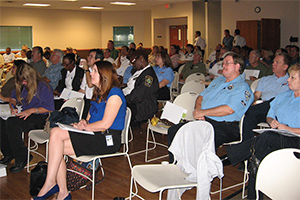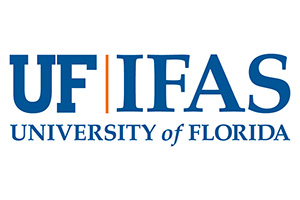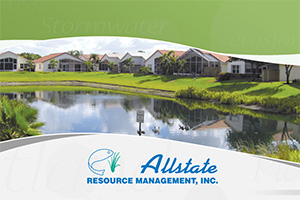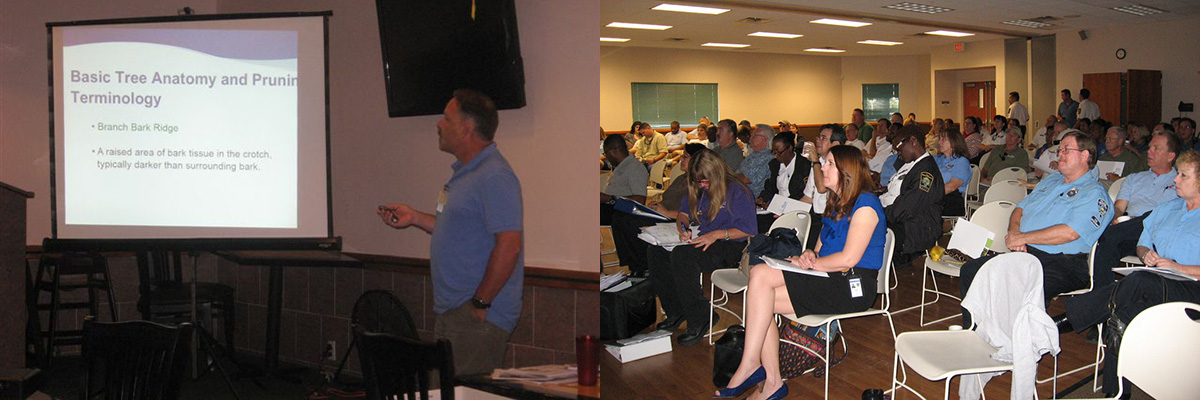
Contact Us to Learn More
954-382-9766 or
info@allstatemanagement.com
Pre-Register for a CEU Course
CEU Workshop Photo Gallery
View Photos from our CEU Workshops
Click the Plus Sign to See the Course Description
Current industry standards for Waterway Management. We will discuss the requirements for Federal, State and County Regulators while educating and keeping your homeowners satisfied. This segment will cover managing lakes and their ecosystems and familiarize property managers with industry standards for equipment, plants, fish and aquatic weed control.
We will explain what mitigation is and why it is necessary. We will discuss the requirements and reporting procedures for Federal, State and County Regulators. This segment will distinguish between the diversity of coastal, wetland and upland preserves. Ecosystems and how they relate to water replenishment and wildlife preservation. Property managers will learn about professional standards and types of methods and equipment used for exotic/invasive weed control to keep them in compliance.
We will discuss types of aquatic weeds and their EPA approved treatments as well as beneficial aquatic plants. Recommended water testing and how it relates to application of herbicides. How Fish stocking and aeration helps to control undesirable plant growth and aquatic pests.
We will discuss the requirements for State, County and Municipal Regulations while educating and keeping your homeowners satisfied. This seminar will cover the functions, components and maintenance of stormwater systems. Familiarize property managers with regulatory standards for maintenance and how stormwater systems affect our ecosystems.
We will discuss the different causes of erosion. This seminar will cover the types of erosion controls, their functions and components. The course will familiarize property managers with industry standards for erosion control methods.
We will discuss the components of water quality and recommended testing. Aspects of poor water quality will be discussed to include prevention and remedies. Various types of aeration equipment and their purposes will be described.
We will discuss and identify native Florida fish and their benefits. Exotic, non native fish which have beneficial or invasive characteristics will be identified and explained. Current practices for the use of fish as a biological control for aquatic weeds and mosquitoes will be discussed. Regulations, compliance and permitting for fish stocking will be described as well as how we can enhance water quality and best management practices for water bodies and a balanced ecosystem.
We will discuss littoral plants and their benefit to the Aquatic environment. This seminar will cover the identification of beneficial aquatic plants and “Florida Friendly Plants”. Familiarize property managers with the new regulatory standards for “Florida Friendly Landscapes” and how the best management practices (BMPs) affect our ecosystems.
We will discuss the benefits of trees including environmental, economic, social and financial. This seminar will cover Tree Anatomy and Terminology, Proper Pruning and Improper Pruning Techniques. How to care for trees and palms in the landscape.
We will discuss tree anatomy and terminology, proper and improper pruning techniques. Participants will learn how to properly care for trees and palms in the landscape.
We will assist the property managers in recognizing invasive pests in the landscape and understanding how to choose an alternative to conventional chemical applications. Emphasis will be on the benefits of biological controls for long term management of pests.
Participants will become familiar with 3 types of whitefly now present in the Florida landscape. Life cycles and management techniques. They will learn about potential chemical resistance. This course will help them spot potential pests and landscape problems on the properties they manage, and how to address them with Best Management Practices.
– Participants will learn important Florida laws governing the installation and use of irrigation systems including their operation and maintenance.
– Participants will be able to identify the principal components of an irrigation system that meets Florida Friendly guidelines.
– Participants will improve their understanding of how to operate and maintain an irrigation system to maintain a healthy Florida -Friendly landscape while conserving water and reducing non-point source pollution from fertilizers and pesticides.
This course is on urban irrigation with smart irrigation technologies, such as soil water sensor based irrigation and evapotranspiration (ET) controller based systems. The course includes background information on rainfall and irrigation in Florida, a research review of relevant studies in Florida, how each system works, the expected water savings with the smart irrigation systems, and resources for more information on the systems
This course is on commercial and industrial stormwater systems. Participants will become familiar with information on the differences between commercial and residential stormwater systems. Understanding how the drainage system works, and how to take proactive steps to deter flooding. The recertification process, Federal, State and local compliance rules and regulations will be discussed.
Property managers will understand how the South Florida Water Management operates the Regional Flood Control System. They will learn how the system works and become familiar with the three tiered stormwater system and its components. They will have an understanding that HOA’s play a vital role in maintaining their community stormwater systems to help manage flood situations. We will discuss what permits are required for building or planting within a Right of Way or Drainage Easement. Participants will learn what to expect during rain and storm events.
We will assist property managers in recognizing invasive pests in the landscape and understanding how to choose an alternative to conventional chemical applications. Emphasis will be on the benefits of biological controls for long term management of pests. Participants will become familiar with 3 types of exotic whitefly now present in the Florida landscape, their life cycles and management techniques. They will learn about potential chemical resistance and controversial use of neonicitinoids and bee colony collapse. Property managers will become familiar with USDA guidelines regarding research and the release of exotic species for biological control. This course will help property managers spot potential pests and landscape problems on the properties they manage, and how to address them with Best Management Practices.
Property managers will become familiar with what aquatic resources are and why they are necessary. We will discuss the requirements of aquatic maintenance, native and invasive aquatic plants, fish stocking, aeration, storm water maintenance, water quality and erosion management.
Property managers will recognize the aquatic landscape and understand the importance of proper maintenance. Emphasis will be on the benefits of biological and chemical controls for long term lake management. Participants will become familiar why our “man-made” lakes are so important in South Florida. Participants will also learn contributing factors to algae occurrence and how it can be treated and controlled. They will become aware of invasive and exotic plant characteristics with examples.
This course will cover the various types of applications and techniques used for Cured in Place Pipe Repair. Participants will go into the pipe repair process with informative videos and photos of how the repair occurs. This seminar will also cover the functions, components and maintenance of stormwater systems. Property managers will gain knowledge in “Know the Flow” of Florida’s waterway systems. We will assist the property managers to become familiar with information on trenchless pipe repair and how these technologies can be used in stormwater pipe repairs.
Florida features a beautiful coastal shoreline, surrounded by sand dunes and restored beaches. Severe beach erosion from storms and rising sea levels, make this famous coastline vulnerable. This condition negatively impacts the residents who reside here. This program will help Property Managers understand the importance of educating their residents on maintaining beach front dunes on their property. Property managers can educate their Board members on why native plantings should be incorporated in budget, and installed on property for hurricane storm protection. This program will go over the current regulations the State of Florida puts on beach front properties and the communities’ responsibility in maintaining native plants to prevent beach front erosion. This program will also go into the role that Department of Environmental Protection plays in regulating private HOA properties.

